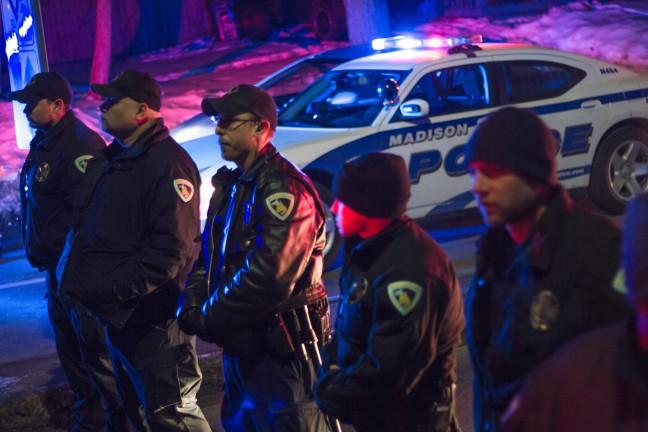As technology continues to advance, the line between privacy and safety continues to blur — especially when it comes to police technology.
Milwaukee police officer Timothy Gauerke said there is always a battle between people wanting constant surveillance of events and personal privacy.
“It’s really finding a balance between the two, by protecting the citizens and making them informed and being as transparent as we can as a police department, but also maintaining their privacy,” Gauerke said.
Legislative efforts
Rep. David Craig, R-Big Bend, recently proposed legislation that would require police to report new technologies to the Legislature.
“The level of technology is rapidly expanding,” Craig said. “I think that the Legislature has to have a grasp on what technology is out there, so that we are not reacting when someone’s civil liberties may be abused.”
His legislation, however, fell under skepticism for its provision to allow access to John Doe investigations and was drafted late in the legislative session. It was not taken up for a vote this session.
Bill would give lawmakers access to secret John Doe investigations
Body cameras draw privacy concerns
While police body cameras are an “unbiased recorder of fact” that serve as an extra witness and uphold accountability, they also have the potential to record people in intimate moments, Gauerke said.
Since current law does not regulate the videos, it is unclear to whom they would be available and who would have access to potentially sensitive information, David Schultz, University of Wisconsin law professor said.
“The emphasis on body cameras started most recently as an effort to sort of keep tabs on the police,” Schultz said. “But obviously those cameras are pointed at citizens.”
Gauerke said one way privacy concerns are protected in the instance of body cameras is through redaction. For instance, the face of a victim of sexual assault may be blurred out to protect their identity.
While some may be concerned with the police’s power to redact certain types of videos, Gauerke said police would be fully transparent about what they redacted and why.
Both the University of Wisconsin Police Department and the Milwaukee County Police Department use body cameras.
Stingrays phone tracking technology elicits lawsuit
Another technology that has drawn concerns for its potential conflict with privacy is Stingray phone tracking. This technology is able to track the location of someone’s cell phone by mimicking a cell tower.
Gauerke said the Milwaukee County Police Department has used Stingray technology, but could not give further details because of an ongoing lawsuit between the ACLU and the Milwaukee County Police Department.
According to the court brief, the phone tracking technology can be used regardless of whether or not the phone is on, even if location privacy settings on the phone are enabled. The ACLU argues this violates an American’s fourth amendment right to privacy.
Most cellphone users carry their phones constantly, allowing their phone to collect intimate data about their daily lives, Dietram Scheufele, UW life science communications professor, said.
Scheufele said citizens have an expectation of privacy for the information being recorded into cellphones, but most people don’t actually know what’s being done with their information.
U.S. Rep. Jim Sensenbrenner, R-Wisconsin, said in a statement the capability of Stingray technology should have been made clear to the public rather than shrouded in secrecy.
“The public has a right to debate the merits of the technology, and criminal defendants have a right to challenge the evidence against them,” Sensenbrenner said.
Brayton Grinnell, Madison Police Department crime analyst, said Madison police do not use stingray technology, but other, larger police organizations in the state do.
Public surveillance on the rise
Rich Beadles, City of Madison technical services manager, said the number of public cameras has increased significantly in past years.
Several years ago, he said there were only 10 surveillance cameras in Madison on State Street. Now there are around 300 cameras in Madison and counting.
“I haven’t seen it slow down,” Beadles said. “I think that we’ll continue to deploy cameras.”
Public surveillance locations in Madison currently include parking ramps, bus transfer points, the metro, some libraries, street construction sites and the Monona Terrace, Beadles said.
Robert Drechsel, UW journalism and mass communications professor, said it is concerning that the public is on camera practically everywhere they go. He said surveillance is so prevalent that people have to assume they are being monitored if they are in a public place.
Police regularly request videos from public surveillance cameras in order to solve crimes, Beadles said, but they do not actively monitor them.
Traffic cameras are also available for the public’s view on the City of Madison’s website, and all public surveillance cameras are open to public records requests.
While these camera’s are open to the public’s viewing, Beadles said they do not just arbitrarily put up cameras, and citizens’ constitutional rights and privacy rights are taken into account.
Looking forward
Scheufele said as new technologies develop, new laws will have to be made to regulate them.
A example of a new technology where regulations are not in place is Snapchat, Scheufele said. Pictures taken on Snapchat are stored on internal servers and are not actually deleted. He said Snapchat users have a reasonable expectation of privacy since the pictures are deleted, but it is unclear whether law enforcement can request that information from Snapchat.
“It’s privacy versus safety and as a society we have to weigh those,” Scheufele said.











